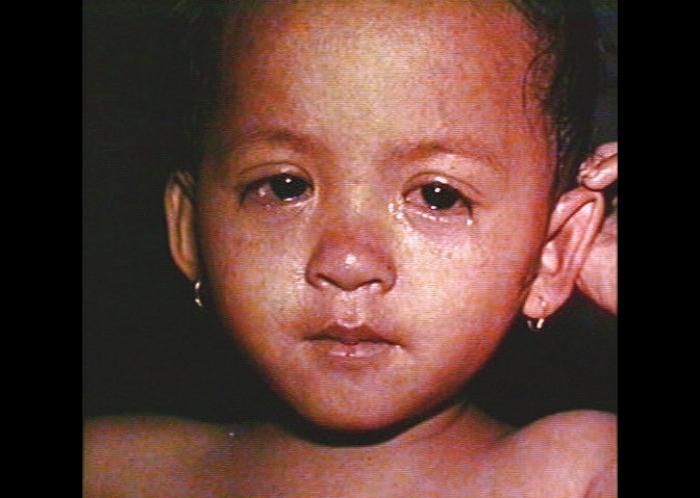Rash Decisions: Vaccine Refusal Is A Position of Privilege

Vaccine refusal is a disheartening side affect of the success of vaccines. Most young parents have only seen vaccine-preventable diseases in pictures of starving children in the developing world or as mockery in cartoons, suggesting that those diseases can’t happen here or that they are nothing to be afraid of.
These impressions could not be more wrong; vaccine-preventable infections are happening here and their return is frightening. The last major outbreak of measles in the U.S. occurred from 1989 - 1991, resulting in 55,000 cases and 123 deaths.
At that time, enough “old-time” (that is pre-vaccine era) doctors were around to recognize measles. But even then few physicians under 35 years of age had seen measles, and during the early days of the outbreak the afflicted children were frequently misdiagnosed and not properly treated.
1989 was 26 years ago, and that’s about the average of age of new parents, including the vaccine-refusers. They haven’t seen measles and don’t know that it isn’t just a rash.
Measles can be a devastating disease that invades lungs, choking the life out of infants and children. The virus can cause deafness or inflame the central nervous system causing encephalitis, which can rob the victim of basic brain functions such as breathing and eating.
SEE ALSO: International Travel For Healthy Adults
Seven to 10 years later, measles infection can cause the meninges (the covering on the brain and spinal cord) to unwind, a rare and lethal condition called subacute sclerosing panencephalitis (SSPE). The complications occur more frequently in children younger than 5 years or adults older than 20 years of age.
Measles is easy to talk about now; it’s on our minds with the number of cases already at 102 and spreading globally. The treacherous virus has seized the opportunity to spread among the under-immunized because our population has reached a critical mass of unvaccinated.
Truthfully though, the problem is bigger than measles and resurgence can happen with any vaccine-preventable disease, as we have seen with pertussis (whooping cough) and chicken pox in recent years. No vaccine is 100% protective or free of risk; true for nearly all things in life and to have that expectation is unreasonable and unrealistic.
Fear of autism caused by vaccines is one of the most common concerns stated by vaccine-refusers; however, data assure us that no link exists. In fact, Andrew Wakefield the doctor who put forth that concept has been disgraced, as he simply fabricated the “data” in his Lancet report, which has been officially retracted.
Publishing reports that puts thousands of children at risk for serious diseases doesn’t quite meet the definition of a crime against humanity, defined as murder, extermination and other inhumane acts of a similar character intentionally causing great suffering or serious bodily or mental injury, but it comes close.
However, data proving no link with MMR (measles-mumps-rubella) vaccine and autism has not allayed the vaccine fears and refusals. The question that everyone should be asking of believers holding on to that myth is “Why”? Brendan Nyhan, a health policy researcher and his colleagues performed a study about vaccine misconceptions to assess the effects of providing accurate vaccine information to ant-vaccine parents.
In the study, parents were given evidence-based information about the MMR vaccine from the Centers for Disease Control and Prevention (CDC), images of children with the infections, a dramatic story about an infant with life-threatening measles and data supporting that measles vaccinations do not cause autism.
After reviewing the info, the parents were less likely to believe the myth that a link existed between MMR and autism. Surprisingly, however, the parents most committed in their anti-vaccine beliefs were even less likely to vaccinate their children.
Counterintuitive, right? What could explain this thinking?
Nyhan postulated that everyone wants to be right, but its more complex that just “being right.” People want to behave in a fashion that is consistent with their previous actions, so as not to appear wacky or unbelievable. Robert Cialdini, a social psychologist, described this behavior as “commitment and consistency,” that humans strive to act consistently with their previous commitments so as to not be perceived as unstable.
So, what can society do now to give vaccine-objectors the opportunity to reconsider data that could change their anti-vaccine positions, and to recognize that they aren’t just making choices for their children but for all of us? Education about the diseases and the vaccines does matter, but the method of delivery is even more critical than the message.
Calling names, as some doctors and media have done, certainly won’t encourage vaccine refusers to listen to the message. Think about it; when is the last time you listened to someone who called you “stupid” to start a conversation? A handful of the vaccine-refusers will never hear the message but some will, so we must try.
Keeping in mind the lessons from social psychologists, we need to give vaccine-refusers a respectful opportunity to change their minds.
As a pediatrician, I wholeheartedly believe that no stable, loving parents would intentional cause harm to their child. I believe this of vaccine–refusing parents too; they are acting in what they perceive as the best interest of their children but choose to dismiss inconvenient facts.
The facts are vaccines save lives. In 1900, approximately 3 of 10 infants died before their first birthday and by the end of the 20th Century, in large part due to vaccines (as well as improved standard of living), the rate had decreased to 7.2 deaths per 1000 infants.
Preventable harm is lurking, as we have clearly seen with the rapid spread of measles from the happiest place on Earth to all corners of the globe. Vaccines make the happiest children on Earth by protecting their, and everyone’s, health. It is a small world, after all.
Reach Contributor ChrisAnna Mink MD here. Follow the Science Desk here.



